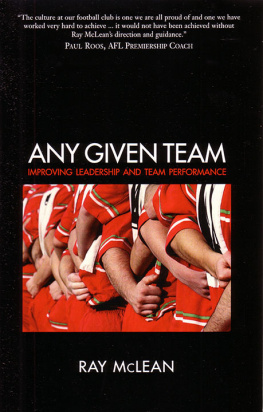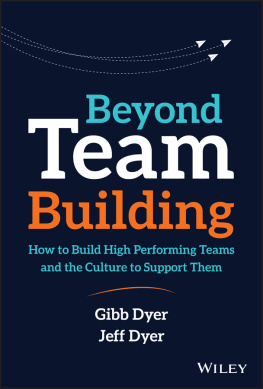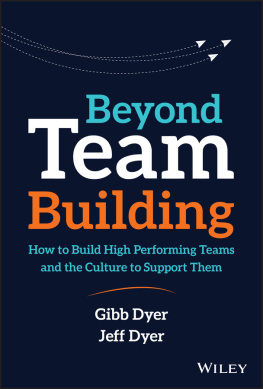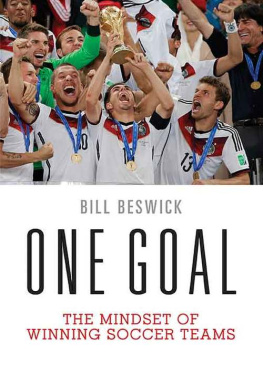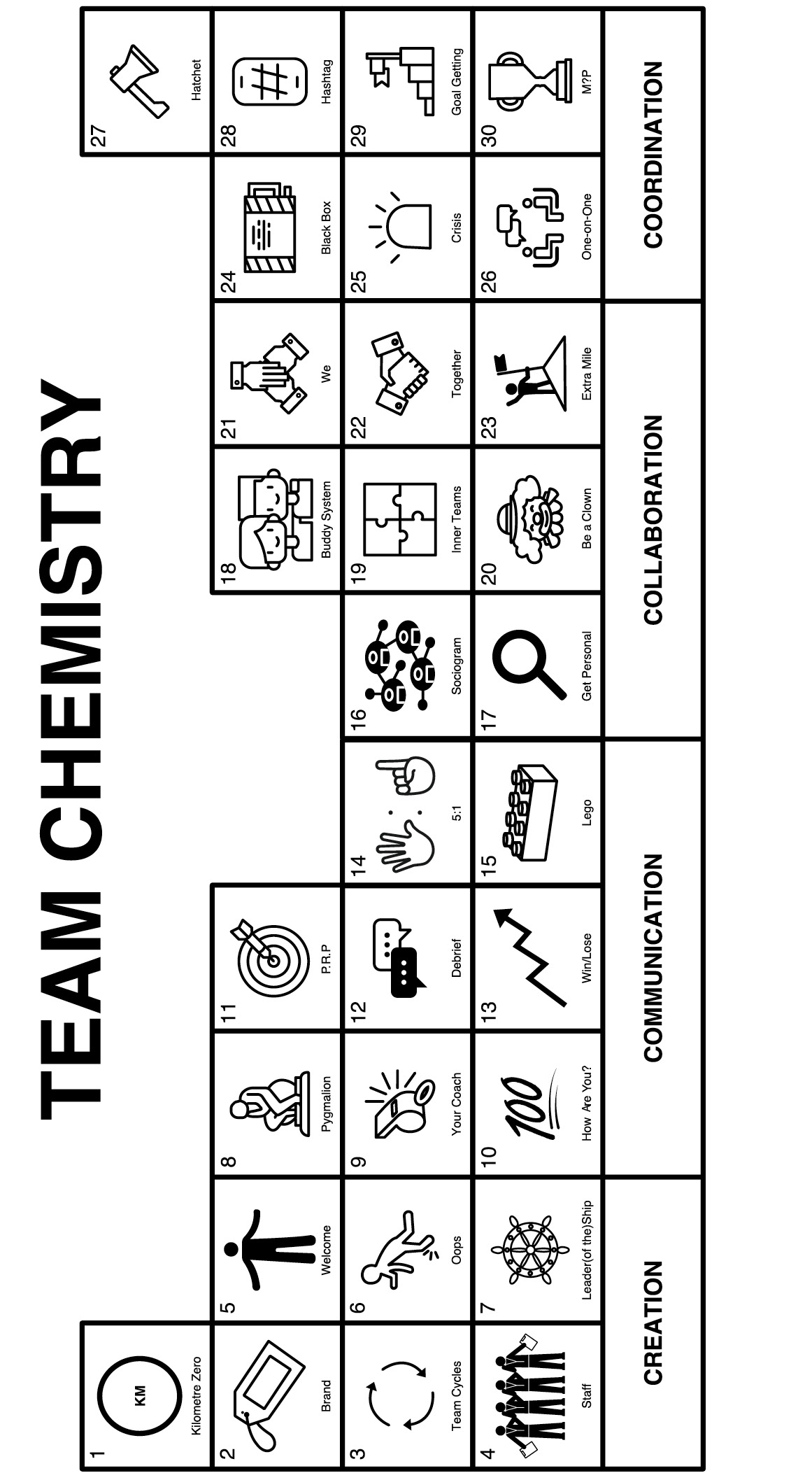Praise For Team Chemistry
To become the best decathlete in the world, you must surround yourself with coaches who think outside the box and who are ready to do things differently. If you dont, chances are, you will end up like your competitors. This book is all about that; it dives into concepts beyond traditional coaching methods. Team Chemistry represents very well how my coaches operate: keep an open mind, challenge the status quo and get creative to find a competitive edge.
Damian Warner, Decathlete, 2020 Olympic Gold Medallist
Sport leaders play such an important role to ensure team success. My favourite coaches werent only great technicians and tacticians; they communicated clearly, instilled confidence and cared about the players. Team Chemistry will be a valuable part of a coachs toolkit.
Laurent DuvernayTardif, NFL guard, Super Bowl LIV champion
Lachance and Mnard show us that building team chemistry one athlete, one staff member, one practice, and one day at a time is about more than just the results on the scoreboard. It is a skill that coaches at any level can learn and their book provides the tools to do so. Team Chemistry will become a trusted resource for coaches in every sport.
Danielle Goyette, three-time Olympian, eight-time World Champion, Player and Coach, HHOF 2017
I have been fortunate enough to work with and observe many talented coaches, the vast majority of them possessing great content knowledge and ability to teach their craft. However, the highly successful coaches were the ones who also invested their time and bandwidth in building a truly superior culture. Team Chemistry provides the tools and techniques to help sport leaders foster an elite culture, a culture of respect and responsibility that will in turn help players and staff reach their optimal performance. A terrific book that both aspiring and veteran coaches should read and put to use.
Kai Correa, Coach, San Francisco Giants, MLB
Creating a healthy culture goes hand in hand with developing how you play, your tactics and strategies, and might even be the most important part of a coachs job. Just like the players we work with, coaches can always improve. Team Chemistry enhanced my thinking in this space and provided me with new ideas for creating the best environment for my players, my staff, and myself.
Bev Priestman, Head Coach, Team Canada Womens Soccer, 2020 Olympic Gold Medallist
For as long as organized team sports have been around, coaches have asked the same questions how can I encourage a group of individuals to value a set of standards, and how can I create an identity that is unique to our team and our environment? How can we win, not just this game or this year, but sustained success over time? Team Chemistry provides important insights and strategies on the complexities of these age-old questions and simple solutions to make your team and culture more robust. A must-read!
Derek Johnson, pitching coach, Cincinnati Reds, MLB
I cant say enough about this excellent book. Having coached and managed collegiate and professional football players for almost 30 years, I know how important it is to put as much energy into building a positive team culture as I spend on the Xs and Os. Team Chemistry provides the tools that anyone in a sports leadership role on the sidelines or in the front office can use to make their team better.
Danny Maciocia, Vanier Cup and Grey Cup championship-winning coach, GM, Montreal Alouettes, CFL
Transitioning from an Olympic figure skater to a coach is a challenging feat. It is important in my new role to educate myself and train my skills, just like I did as an elite athlete. Because Team Chemistry is filled with practical tools, it will become a go-to resource for years to come.
Scott Moir, Figure Skater and Coach, three-time Olympic and World Champion
As coaches we dream of our teams playing in perfect harmony. But to get our athletes to reach their potential and for the group to work in unity it takes the common and concerted effort of so many. Team Chemistry offers valuable tools to help coaches orient their work and save time and energy by enabling strategies to maximize the rendement of everyone involved in developing a culture of excellence.
Glenn Hoag, Head Coach, Team Canada 2020 Olympic Mens Volleyball
The life of a coach surprises you every day and the tools in Team Chemistry empower the sort of communication, cohesion, and cooperation that can help all sport leaders achieve their goals and realize their potential. Whether selecting staff, finessing a team towards better cooperation, seeking better ways to present ideas, or searching for a different way to approach an underperforming player, this book provides answers. There is wisdom on every page... I urge you to read it.
Ric Charlesworth, Olympic and World Cup gold medal-Winning Coach, Australian National Mens and Womens Field Hockey
Team Chemistry: Table of Elements
Introduction
November 13, 2019 Palacio de las Convenciones, Havana, Cuba
I had just finished giving my keynote address in a conference room. My presentation highlighted the leadership principles I use as a baseball coach. I collected all of my belongings before leaving the stage to take a seat and listen to the next speaker. Scheduled every two years, this international conference showcases the latest research and best practices in the world of elite sport and physical activity.
The trip to Havana the day before was an interesting journey. Leaving from Ottawa, Canada, I missed my connecting flight and ended up arriving in Cuba very late at night. The lack of sleep made it very difficult to listen attentively to the presentations following mine.
One presenter in particular did not help the cause. Not only did he speak in a monotonous voice, but his presentation was filled with abstract theoretical concepts. It was not very engaging I had to fight hard to camouflage the yawns that kept creeping up on me.
This presentation brought back painful memories of my high school chemistry classes atoms and molecules were not my cup of tea. My science mark did not get any better in college. My parents forced me to study hard sciences because back in the day it was well known that studying hard sciences would lead to job opportunities.
Big mistake.
I scored 17 percent on my first chemistry exam. Luckily, the professor was nice enough to let me retake the exam. I ended up doing a little better: 25 percent. This result prompted an expedited visit to the guidance counsellors office for a change of program. From then on, I had no interest in anything related to chemistry concepts.
Despite disliking the subject, I did retain a few positive memories of playing around with Bunsen burners, test tubes and beakers during chemistry lab sessions. I could relate to the experiments because they were hands-on. As a predominantly visual learner, I was also captivated by something else in chemistry class: the periodic table of elements.




